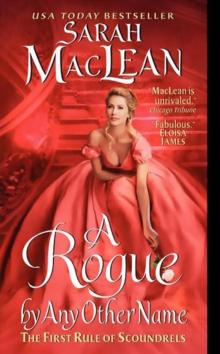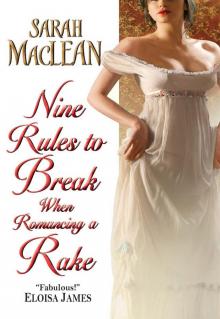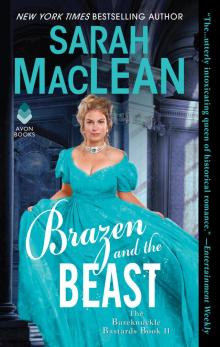- Home
- Sarah MacLean
A Rogue by Any Other Name_The First Rule of Scoundrels Page 3
A Rogue by Any Other Name_The First Rule of Scoundrels Read online
Page 3
“Yes. I was present for that bit,” Penelope said.
This time, Pippa lifted her water goblet to hide her smirk.
“Needham!” Lady Needham decided she required additional support. “Thomas proposed to Penelope!”
Lord Needham lowered his paper. “Did he? I always liked that Tommy Alles.” Turning his attention to his eldest daughter, he said, “All right, Penelope?”
Penelope took a deep breath. “Not precisely, Father.”
“She did not accept!” The pitch at which her mother spoke was appropriate only for the most heartbreaking of mourning or a Greek chorus. Though it apparently had the additional purpose of setting dogs to barking.
After she and the dogs had completed their wails, Lady Needham approached the table, her skin terribly mottled, as though she had walked through a patch of itching ivy. “Penelope! Marriage proposals from wealthy, eligible young men do not blossom on trees!”
Particularly not in January, I wouldn’t think. Penelope knew better than to say what she was thinking.
When a footman came forward to serve the soup that was to begin their evening meal, Lady Needham collapsed into her chair, and said, “Take it away! Who can eat at a time like this?”
“I am quite hungry, actually,” Olivia pointed out, and Penelope swallowed back a smile.
“Needham!”
The marquess sighed and turned to Penelope. “You refused him?”
“Not exactly,” Penelope hedged.
“She did not accept him!” Lady Needham cried.
“Why not?”
It was a fair question. Certainly one that everyone at the table would have liked to have answered. Even Penelope.
Except, she did not have an answer. Not a good one. “I wanted to consider the offer.”
“Don’t be daft. Accept the offer,” Lord Needham said, as though it were as easy as that, and waved the footman over for soup.
“Perhaps Penny doesn’t wish to accept Tommy’s offer,” Pippa pointed out, and Penelope could have kissed her logical younger sister.
“It’s not about wishing or otherwise,” Lady Needham said. “It’s about selling when one can.”
“What a very charming sentiment,” Penelope said dryly, trying her very best to keep her spirits up.
“Well it’s true, Penelope. And Thomas Alles is the only man in society who appears willing to buy.”
“I do wish we could think of a better metaphor than purchase and sale,” Penelope said. “And, truly, I don’t think he wants to marry me any more than I want to marry him. I think he’s just being kind.”
“He isn’t just being kind,” Lord Needham said, but before Penelope could probe on that particular insight, Lady Needham was speaking again.
“It’s hardly about wanting to marry, Penelope. You’re far beyond that. You must marry! And Thomas was willing to marry you! You’ve not had a proposal in four years! Or had you forgotten that?”
“I had forgotten, Mother. Thank you very much for the reminder.”
Lady Needham lifted her nose. “I gather you mean to be amusing?”
Olivia’s brows rose, as though the very idea of her eldest sister being amusing was unbelievable. Penelope resisted the urge to defend her sense of humor, which she liked to think was very much intact.
Of course she hadn’t forgotten it. Indeed, it was a difficult fact to forget, considering how often her mother reminded her of her marital state. Penelope was surprised that the marchioness did not know the number of days and hours that had passed since the proposal in question.
She sighed. “I am not aiming for humor, Mother. I’m simply . . . not certain that I want to marry Thomas. Or anyone else who isn’t certain that he wants to marry me, honestly.”
“Penelope!” her mother barked. “Your wants are not paramount in this situation!”
Of course they weren’t. That wasn’t how marriage operated.
“Really. How very ridiculous!” There was a pause as the marchioness collected herself and attempted to find her words. “Penelope . . . there is no one else! We’ve searched! What will become of you?” She collapsed elegantly back in her chair, one hand to her brow in a dramatic gesture that would have made any one of the actresses on the London stage proud. “Who will have you?”
It was a fair question, and one that Penelope should probably have considered more carefully before she revealed her uncertainty about her marital future. But she hadn’t exactly decided to make such an announcement, at least, not until she’d made it.
And now, it seemed like the best decision she’d made in a very long while.
The thing was, Penelope had had plenty of opportunity to be “had” in the past nine years. There had been a time when she was the talk of the ton—passably attractive, well behaved, well-spoken, well-bred, perfectly . . . perfect.
She’d been betrothed, even. To a similarly perfect counterpart.
Yes, it had been a perfect match, except for the fact that he had been perfectly in love with someone else.
Scandal had made it easy for Penelope to end the engagement without being jilted. Well, at least, not precisely.
She would not describe it as a jilt, exactly. More of a jolt, really.
And not an unwelcome one.
Not that she would tell her mother that.
“Penelope!” The marchioness straightened again, her anguished gaze on her eldest daughter. “Answer me! If not Thomas, then who? Who do you suppose will have you?”
“I shall have myself, it seems.”
Olivia gasped. Pippa paused, her soup spoon halfway to her lips.
“Oh! Oh!” The marchioness collapsed once more. “You cannot mean it! Don’t be ridiculous!” Panic and irritation warred in Lady Needham’s tone. “You are made of stronger stuff than spinsters! Oh! Don’t make me think of it! A spinster!”
Penelope thought that it was in fact the spinsters who were made of stronger stuff than she, but she refrained from saying such a thing to her mother, who looked as though she might topple from her chair in a state of utter desperation.
The marchioness pressed on. “And what of me? I was not born to be a spinster’s mother! What will they think? What will they say?”
Penelope had a very good idea of what they already thought. What they already said.
“There was a time, Penelope, when you were to be the very opposite of what you have become! And I was to be the mother of a duchess!”
And there it was. The specter that loomed between Lady Needham and her eldest daughter.
Duchess.
Penelope wondered if her mother would ever forgive her for the dissolution of the engagement . . . as though it had been Penelope’s fault somehow. She took a deep breath, attempting a reasonable tone. “Mother, the Duke of Leighton was in love with another woman—”
“A walking scandal!”
Whom he loves beyond measure. Even now, eight years later, Penelope felt a twinge of envy . . . not for the duke, but for the emotion. She pushed the feeling aside. “Scandal or no, the lady happens to be the Duchess of Leighton. A title, I might add, that she has held for eight years, during which time she’s birthed the future Duke of Leighton and three additional children for her husband.”
“Who should have been your husband! Your children!”
Penelope sighed. “What would you have me do?”
The marchioness popped up once more. “Well! You could have tried a bit harder! You could have accepted any number of proposals after the duke’s.” She flopped back again. “There were four of them! Two earls,” she recounted, as though proposals of marriage might have slipped Penelope’s mind, “then George Hayes! And now Thomas! A future viscount! I could accept a future viscount!”
“How very magnanimous of you, Mother.”
Penelope sat back in her chair. She supposed that it was true. Lord knew that she had been trained to try very hard to land a husband—well, as hard as one could try without appearing to be trying too hard.
But in the past few years, her heart hadn’t been in it. Not really. For the first year after the broken engagement, it was easy to tell herself that she did not care to marry because she was shrouded in the scandal of a broken engagement, and no one showed much interest in her as a potential bride.
After that, there had been a few proposals, all men with ulterior motives, all eager to marry the daughter of the Marquess of Needham and Dolby, either for their political careers or their financial futures, and the marquess hadn’t minded much at all when Penelope had politely declined those offers.
It hadn’t mattered to him why she’d said no.
Hadn’t occurred to him that she might have said no because she’d had a glimpse of what marriage could be—because she’d seen the way the Duke of Leighton had gazed, lovingly, into the eyes of his duchess. She’d seen that there might be something more to come from a marriage if she only had enough time to find it.
But somehow, during that time when she told herself she was waiting for more, she’d lost her chance. She’d become too old, too plain, too tarnished.
And today, as she’d watched Tommy—a dear friend, but not much else—offer to spend the rest of his life with her, despite his own utter disinterest in their marriage . . . she simply couldn’t say yes.
She couldn’t ruin his chances at something more.
No matter how disastrous her own were.
“Oh!” The keening began once more. “Think of your sisters! What of them?”
Penelope looked to her sisters, who were watching the conversation as though it were a badminton ma
tch. Her sisters would be fine. “Society shall have to make do with the younger, prettier Marbury daughters. Considering the fact that the two married Marbury daughters are a countess and a baroness, I should think all will be well.”
“And thank goodness for the twins’ excellent matches.”
Excellent was not precisely the description Penelope would use to describe either Victoria or Valerie’s matches—made for title and dowry and little else—but their husbands were relatively innocuous and at least discreet with their activities outside the marriage bed, so Penelope did not argue the point.
No matter. Her mother was plunging onward.
“And what of your poor father? It’s as though you have forgotten that he was plagued with a houseful of girls! It would be different if you’d been a boy, Penelope. But he is positively sick with worry over you!”
Penelope turned to look at her father, who dipped a piece of bread in his bisque and fed it to the large black water dog seated at his left hand, staring up at him, long pink tongue lolling out of the side of her mouth. Neither man nor beast seemed particularly sick with worry. “Mother, I . . .”
“And Philippa! Lord Castleton has shown interest in her. What of Philippa?”
Now Penelope was confused. “What of Philippa?”
“Precisely!” Lady Needham waved a white linen napkin in a dramatic way. “What of Philippa?”
Penelope sighed and turned to her sister. “Pippa, do you feel that my refusing Tommy will impact your suit from Lord Castleton?”
Pippa shook her head, eyes wide. “I can’t imagine it would. And if it did, I honestly wouldn’t be devastated. Castleton’s a bit . . . well, uninteresting.”
Penelope would have used the word unintelligent, but she allowed Pippa her politeness.
“Don’t be so silly, Philippa,” the marchioness said, “Lord Castleton is an earl. Beggars cannot be choosers.”
Penelope gritted her teeth at the adage, her mother’s favorite when discussing her unmarried daughters’ prospects. Pippa turned her blue gaze on her mother. “I was not aware that I was begging.”
“Of course you are. You all do. Even Victoria and Valerie had to beg. Scandal does not simply disappear.”
Penelope heard the meaning of the words even if it wasn’t articulated. Penelope’s ruined it for all of you.
A pang of guilt thrummed through her, and she tried to ignore it, knowing that she shouldn’t feel guilty. Knowing that it wasn’t her fault.
Except, it might have been.
She pushed the thought away. It wasn’t. He’d loved another.
But why hadn’t he loved her?
It was a question she’d asked herself over and over during that long-ago winter, when she’d been holed up here, in the country, reading the scandal sheets and knowing that he’d chosen someone more beautiful, more charming, more exciting than she. Knowing that he was happy, and she was . . . unwanted.
She hadn’t loved him. She hadn’t thought much at all about him.
But it smarted nonetheless.
“I’ve no intention of begging,” Olivia entered the conversation. “It’s my second season, I’m beautiful and charming, and I’ve a very large dowry. Larger than any man can overlook.”
“Oh, yes. Very charming,” Pippa said, and Penelope looked down at her plate to hide her smile.
Olivia caught the sarcasm. “Laugh all you like, but I know what my value is. I’m not going to let what happened to Penelope happen to me. I’m landing myself a true aristocrat.”
“A fine plan, darling.” Lady Needham beamed with pride.
Olivia smiled. “Thank goodness I’ve learned my lessons from you, Penny.”
Penelope could not help defending herself. “It’s not as though I chased him away, Olivia. Father ended the engagement because of Leighton’s sister’s scandal.”
“Nonsense. If Leighton had wanted you, he would have fought for you, scandal be damned,” her youngest sister said, lips pursed, a born ingénue. “But he didn’t. Want you, that is. Though I suppose he didn’t fight for you, either. And I can only imagine that he didn’t do those things because you didn’t work hard enough to keep his attention.”
Being the youngest, Olivia had never had to think much about the way her words, always a touch too forthright, might sting. Now was no exception. Penelope bit the inside of her cheek, resisting the urge to scream, He loved another! But she knew an exercise in futility when she found one. Broken engagements were the woman’s fault, always. Even when the woman in question was your older sister, apparently.
“Yes! Oh, Olivia, only one season out and already you are so astute, darling,” Lady Needham chirped, before moaning, “And don’t forget the others.”
They had all appeared to have forgotten that she didn’t wish to marry the others. But Penelope still felt she should defend herself. “I received a proposal of marriage this afternoon if you’ll recall.”
Olivia waved one hand dismissively. “A proposal from Tommy. That’s not a good proposal. Only a henwit would think he asked because he wanted to marry you.”
One could always count on Olivia to speak the truth.
“To that end, why did he ask?” Pippa interjected, not meaning for the question to be cruel, Penelope was certain. After all, she’d asked herself—and Tommy—that very question not an hour earlier.
She would like to say, Because he loves me.
Well, that wasn’t precisely true. She’d like to say the words. But not about Tommy.
Which was why she hadn’t said yes.
In all her years, she’d never once imagined marrying Tommy.
He’d never been the one of whom she dreamed.
“It’s not important why he asked,” Lady Needham interjected. “What’s important is that he was willing to take in Penelope! That he was willing to give her a home and a name and care for her as your father has for all these years!” She leveled Penelope with a look. “Penelope, you must think, darling! When your father dies! What then?”
Lord Needham looked up from his pheasant. “I beg your pardon?”
Lady Needham waved one hand in the air as though she hadn’t time to think about her husband’s feelings, instead prodding, “He shan’t live forever, Penelope! What then?”
Penelope could not think of why this was in any way relevant. “Well, that shall be very sad, I imagine.”
Lady Needham shook her head in frustration. “Penelope!”
“Mother, I honestly have no idea what you are implying.”
“Who will take care of you? When your father dies?”
“Is Father planning to die soon?”
“No,” her father said.
“One never knows!” Tears were welling in the marchioness’s eyes.
“Oh, for God’s—” Lord Needham had had enough. “I’m not dying. And I take no small amount of offense in the fact that the thought simply rolled off your tongue.” He turned to Penelope. “And as for you, you’ll marry.”
Penelope straightened her shoulders. “This is not the Middle Ages, Father. You cannot force me to marry someone I do not wish to marry.”
Lord Needham had little interest in the rights of women. “I’ve five daughters and no sons, and I’ll be damned if I leave a single one of you unmarried and fending for yourself while that idiot nephew of mine runs my estate into the ground.” He shook his head. “I will see you married, Penelope, and married well. And it’s time you stop dickering around and accept yourself a suit.”
Penelope’s eyes went wide. “You think I’ve been dickering around?”
“Penelope, language. Please.”
“To be fair, Mother, he did say it first,” Pippa pointed out.
“Irrelevant! I didn’t raise you girls to speak like common . . . common . . . oh, you know.”
“Of course you’ve been dickering around. It’s been eight years since the Leighton debacle. You’re the daughter of a double marquess with the money of Midas.”
“Needham! How crass!”
Lord Needham looked to the ceiling for patience. “I don’t know what you’ve been waiting for, but I do know I’ve coddled you too long, ignoring the fact that the Leighton debacle cast a pall over the lot of you.” Penelope looked to her sisters, who were both staring down at their laps. Guilt whispered through her as her father continued, “I’m through with it. You’ll marry this season, Penny.”

 A Rogue by Any Other Name
A Rogue by Any Other Name One Good Earl Deserves a Lover
One Good Earl Deserves a Lover Ten Ways to Be Adored When Landing a Lord
Ten Ways to Be Adored When Landing a Lord Nine Rules to Break When Romancing a Rake
Nine Rules to Break When Romancing a Rake A Duke Worth Falling For
A Duke Worth Falling For No Good Duke Goes Unpunished
No Good Duke Goes Unpunished Brazen and the Beast
Brazen and the Beast Never Judge a Lady by Her Cover
Never Judge a Lady by Her Cover Wicked and the Wallflower
Wicked and the Wallflower The Rogue Not Taken
The Rogue Not Taken Bombshell
Bombshell A Scot in the Dark
A Scot in the Dark Eleven Scandals to Start to Win a Duke's Heart
Eleven Scandals to Start to Win a Duke's Heart Naughty Brits: An Anthology
Naughty Brits: An Anthology The Day of the Duchess
The Day of the Duchess Never Judge a Lady By Her Cover: Number 4 in series (The Rules of Scoundrels series)
Never Judge a Lady By Her Cover: Number 4 in series (The Rules of Scoundrels series) Wicked and the Wallflower: Bareknuckle Bastards Book 1
Wicked and the Wallflower: Bareknuckle Bastards Book 1 Never Judge a Lady by Her Cover_The Fourth Rule of Scoundrels
Never Judge a Lady by Her Cover_The Fourth Rule of Scoundrels